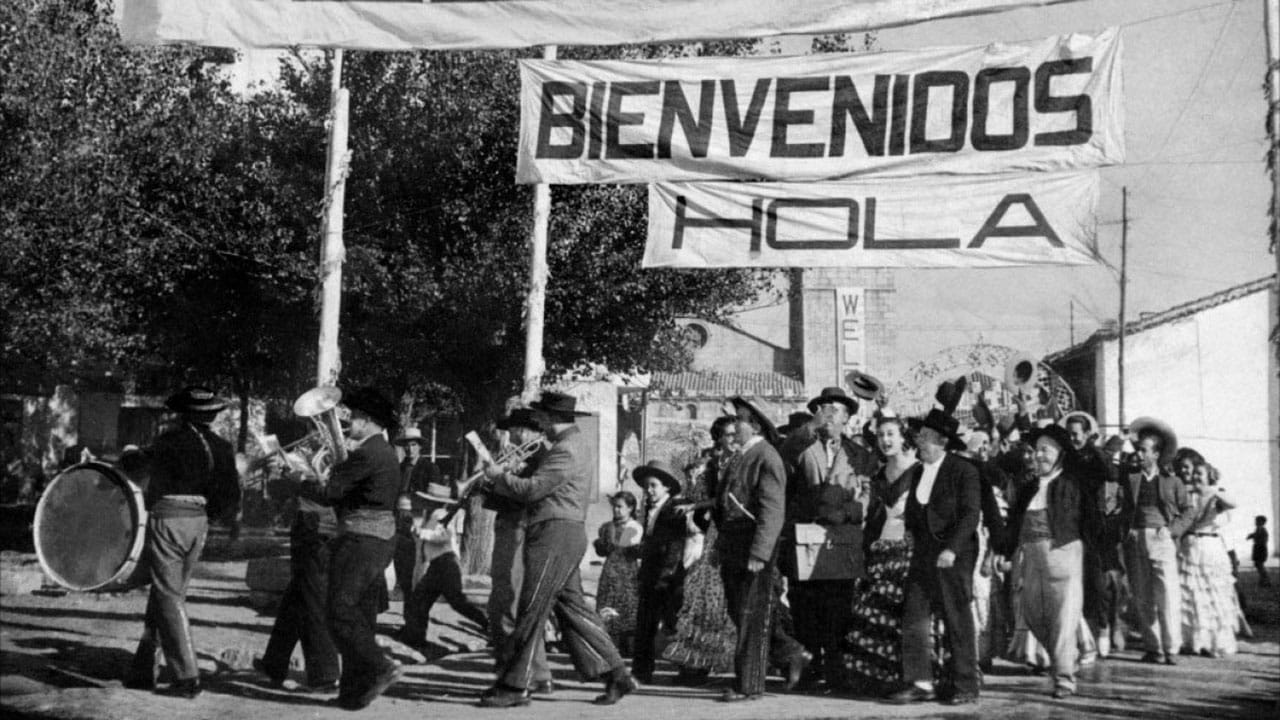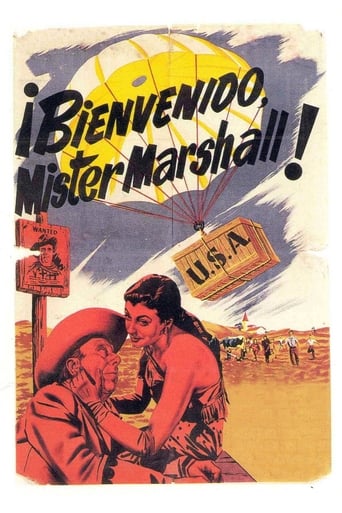



Very very predictable, including the post credit scene !!!
View MoreWhat makes it different from others?
Perfectly adorable
After playing with our expectations, this turns out to be a very different sort of film.
View MoreGentle, sometimes very funny political satire, somewhat reminiscent of the UK Ealing Studio films. The poor, small Spanish town of Villar del Rio is abuzz with the news that American officials are coming to visit, and plan to show off their best face in an effort to get their slice of the Marshall Plan pie. (Spain was actually excluded from the funds). While sometimes predictable, and sometimes badly post dubbed this is a fun film with just enough edge to look at the darker side of human nature, but with a smile.Frustratingly this classic of Spanish cinema isn't available on US DVD. I had to order mine from Amazon Spain (although it has US subtitles, and looks pretty good.)
View MoreImpressive satire typically Spanish which had an international impact , including a prize in Festival of Cannes . The little village of Villar del Río is awaiting the Flamenco singer named Carmen Vargas (Lolita Sevilla) , 'The Great Andalusian Star' who arrives with her agent (Manolo Moran) . After finding out that USA people are visiting the Spanish cities , the villagers think they will give economical aid to village by village , town by town . The citizens of Villar del Río start preparing themselves to welcome them when they arrive . The movie deals upon a bunch of motley people , the Mayor (Jose Isbert) , the teacher woman (Elvira Quintilla) , the pharmaceutic (Nicolas Perchicot) , the doctor (Felix Fernandez) , the priest , all of them set up a splendid welcome for profits the village . They start to work, and also to dream and think about what they're going to request the North American people , who will come with lots of gifts and dollars .In the flick there are especially comedy , humor , joy , satire and social critical which tended not to be very well received by the censor . Sublime film but with censorship realized by the great maestro Luis Garcia Berlanga . Good film that was beset by difficulties with the censors caused by a relentless critical to Americans and social criticism . The movie displays a Spanish secondary star-studded such as : Elvira Quintilla , Alberto Romea, Jose Franco , Joaquin Roa , Jose Vivo , Rafael Alonso , Manuel Alexandre and Angel Alvarez . Unforgettable performance by Jose Isbert as a deaf, naughty and good-natured Mayor, who's only seeking the way to give life to the place and Manonolo Moran as an artist agent who throws surprising initiatives, moving all the village people just to prepare a better reception for the foreigners . Enjoyable screenplay by humorist Miguel Mihura along with Juan Antonio Bardem and Berlanga , both of whom collaborated in various films as ¨Esa Pareja Feliz¨, Berlanga's first picture . Direction by Luis Garcia Berlanga is pretty good , assistant direction is Ricardo Muñoz Suay . Jesus Garcia Leoz's musical score is excellent with classic songs as ¨Americanos¨, however they are too many ¨Coplas¨ songs sung by Lolita Sevilla . Fine cinematography in white and black by Manuel Berenguer , prestigious cameraman with an important career . Berlanga's conceptual and political audacity, so evident in this film , ¨Welcome Mister Marshall¨ , was modified by the censors and was temporarily delayed before its eventual release . He filmed other polemic movies during the 50s as ¨El Verdugo¨ which was well-received at the Venice Festival and along with ¨Bienvenido Mister Marshall¨ are considered to be two of the best Spanish films of the history . Their next joint venture was ¨Plácido¨ (1961), which received an Oscar nomination in 1963. That same year, Berlanga made one of his best films : ¨El Jueves Milagro¨ ; however, his strong portrait of Spanish society didn't please the pro-Franco authorities and was strongly censored . He continued filming other interesting pictures as in 1973 he went to Paris to begin filming ¨Grandeur nature¨ , another problematic film , focusing this time on the fetishism of a man who falls in love with a doll . Several years later, after Franco's death, he filmed a trilogy comprising ¨La Escopeta Nacional¨ (1978), ¨Patrimonio Nacional¨ (1981) and ¨Nacional III¨ (1982), where he clarified the disorders evident in the Spanish upper middle-class upon being confronted with a new political status quo . Following the same theme he filmed a peculiar comedy titled ¨La Vaquilla (1985¨, set in the Spanish Civil War until his last movie ¨Paris Tombuctu¨ (1999) . Rating : Above average . Essential and indispensable seeing .
View MoreMy appreciation of this film has been getting better and better each time I have watched it. The first time I sat to see Bienvenido Mister Marshall was many years ago. I was a child, and I remember that I liked it. But I didn't notice that it wasn't another funny film. Through repeated viewings, I have found more and more details and a solid structure that makes of this film one of the greatest ones I have ever seen. The personality of the Major is amazing. He's a complex person despite his envelope of bewildered, and -I guess- that's why he's the Major. But he's also wonderfully ingenuous, and so are the rest of the people of Villar del Río. That's why you root for the entire cast. And that's why you keep this film in your heart. It reminds you the innocence we lost and lets you by the end with deep melancholy.Technically, this film is almost perfect. Good cast, superb performances, perfect music, and a dialogue that seems to be a 70-minute-long quote, where every single word can be remembered. To mention one of the many good moments of this "long quote", I will remember the one when the general delegate (José Franco) tells the Major (José Isbert) that he has to make a speech from the balcony to the Americans. The Major asks "And what shall I say?", and then the delegate replies that he can speak about several things including the industry. He asks again "What industry?", and the delegate replies "Well, just say anything, they don't speak Spanish so they won't understand". And, finally, the Major states: "Oh, I think I'm getting it..."If you take a look at the best Spanish films of all time, you'll notice that 3 of the top 5 films are directed by Luis García Berlanga. That's not a coincidence. Berlanga is pure genius.My rating is 9-10 out of 10.
View MoreI have seen this film in its original version and in a French translation, and I must admit that, as far as all cinematic qualities are concerned, it reminds me very much of those glorious British Ealing Studios comedies of the 50s.
View More